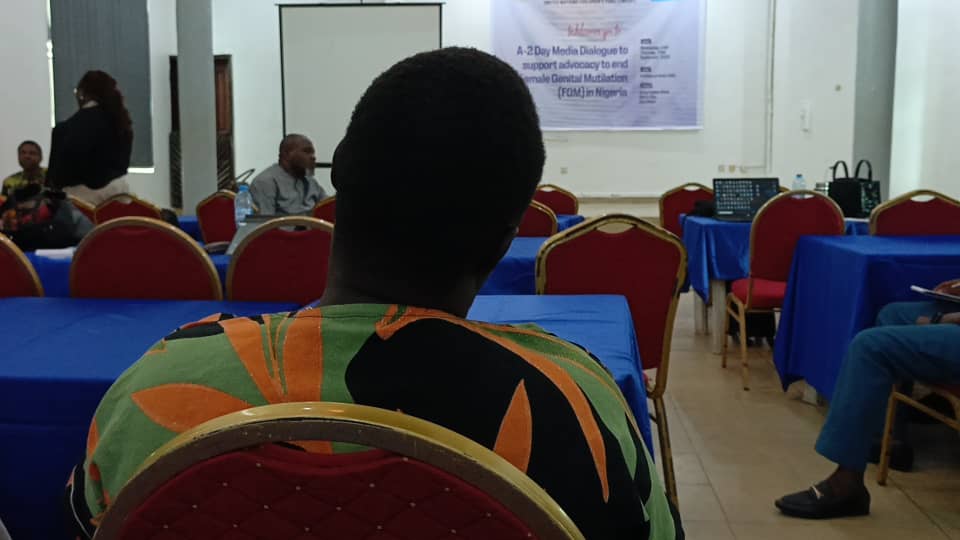
Survivors of FGM Recount Experiences After Horrific Tribal Procedure
The horrors of Female Genital Mutilation, FGM, suffered by young ladies and girls in Benin city, Edo State has been laid bare by survivors and perpetrators of the procedure.
The practice involves removing and injuring healthy and normal female genital tissue, interfering with the natural functions of girls’ and women’s bodies. It can lead to immediate health risks, as well as a variety of long-term complications affecting women’s physical, mental and sexual health and well-being throughout the life-course.
FGM is defined by World Health Organization (WHO) as all procedures that involve partial or total removal of external female genitalia, or other injury to female genital organs for non-medical reasons. Four types of FGM/C are known. Type I is the partial or total removal of the clitoris. Type II is the partial or total removal of the clitoris and the labia minora. Type III is narrowing of the vaginal opening through creation of a covering seal. The seal is formed by cutting and repositioning labia minora and/or labia majora, and often with stitching. Type IV consists of all other harmful procedures to female genitalia like pricking, piercing, incising, scraping and cauterization for non-medical reason.
Some survivors/former perpetrators of this practice shared their personal experiences as victims of the practice, attitude of the elderlies (community leaders), and what they think about the practice.
A 38 year old lady from the indigenous Igbo tribe, in Enugu state, Bature Baci, on Thursday, told how she was cut without her consent on the orders of family members.
Meanwhile, Bature who was a victim of this act, joined the practice at age 25, and performed the operation, on girls too. She told how girls were subjected to the surgery with no anaesthetic, and bled severely.
Her story was revealed in Benin city, Edo state during a 2-day media dialogue to support advocacy to end female genital mutilation in Nigeria, organised by the Oyo State Ministry of Information, in collaboration with United Nations Children’s Fund, UNICEF, which aims to put an end to FGM, by 2030.
The pain that Bature went through, as a cutter and survivor of this act was terrible but not unique to her, as the problem was shared by some other women.
Another repentant cutter, who is a Traditional Birth Attendant, 56 year old Bridget recalled her experience after cutting her daughter and close family associates.
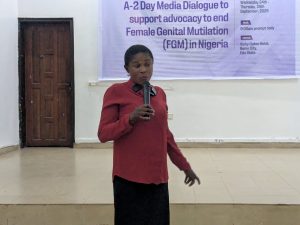
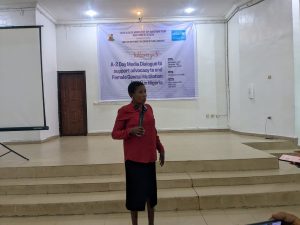
She said, FGM can leave a lasting mark on the lives and minds of those who have suffered from it, and it could be responsible for various marital complications in the short-term and the long-term, such as sexual dysfunction.
Bridget, said performing this traditional process on her daughter who is now in the diaspora, has caused a permanent enmity between them.
She said, “I have surrendered my knife as a cutter, though I used to carry out the procedure on only family members. But with the experience I am having with my daughter now, I recommend other cutters to stop this hazardous act.”
Pastor Ken Izah, from Benin city, an advocate against FGM, said cutting a girl-child is against biblical tenets.
Izah, the lead pastor, Ark of Refuge Christian Centre, said God does not support FGM, as seen in Genesis 17, where God instructed Abraham to circumcise only his male children, saying FGM has no place in the Bible, and must not have a place in the community.
“Every opportunity I have to interact with parents and women, I preach against FGM.”
He shared an experience, how he averted the cutting of a girl-child, by a man, whose parents mounted pressure on to cut his only daughter.
A mother of five girls, Sarah Adeola said three of her daughters were cut, while two were not cut, due to paucity of funds.
However, a meeting with Nurse Ada, in Edo State changed her perception about FGM.
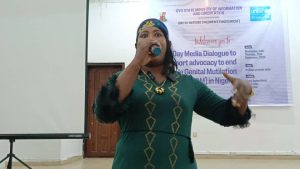
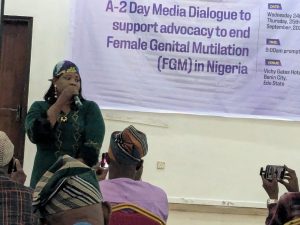
She said Female genital mutilation has no health benefits, and it harms girls and women in many ways. According to her, the practice can lead to immediate health risks, as well as a variety of long-term complications affecting women’s health.
Sarah Adeola regretted making her three daughters take part in the practice due to the popular belief that children who are not cut, would not stay in their husband’s house.
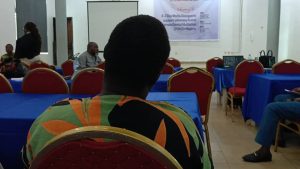
A survivor as well, Sarah said the perpetrator of the practice is a chemist and midwife in her neighbourhood.
Another survivor of FGM and Private school teacher, Doris Akare she was mutilated at 8-days, which made her spend extra three months at Lagost State University Teaching Hospital, LUTH.
“FGM is a No-No for me. Every mythical belief about promiscuity of women is not good.”
She blames some elders for sticking to this traditional practice and harassing individuals who refused to comply with their beliefs and values.
Doris Akare appealed to CSOs and UNICEF to take the advocacy to rural communities, where the practice is rampant.
Mrs. Akare said the revised penal code of the country which banned the practice and the “awareness creation campaign” must be implemented, with the assistance of CSOs.
She appealed to policy makers and local stakeholders to intervene in order to end FGM practice in Nigeria.
Tags:
No tags
Related Posts

Makinde Is A God-sent Man, Says Martins, Oyo NLC Chairman
9/15/2025

Empty Pots Speak Louder Than Political Statements By Abidemi Adebamiwa
9/14/2025

Letter to Editor: Urgent Need for Oyo Govt to Stop Annual Textbook Changes in Schools
9/14/2025

BEFORE AND AFTER A PERSON IS DECLARED WANTED BY THE EFCC: WHAT YOU MUST KNOW By Pelumi Olajengbesi Esq.
9/6/2025
Loading...